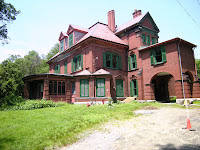Brooks Estate275 Grove St.Medford, Mass. 
Living in and surrounded by the crowded urban life of eastern Massachusetts today it is hard to imagine that in times past large tracts of open and sometimes forested, land still existed. Not just small working farms, but often the land was part and parcel of large estates owned by wealthy individuals and families. These personal estates, some of them consisting of hundreds of acres, were in most cases eventually broken up and sold off by the families descendants many years ago.
Occasionally, the estates were preserved long enough so that the open space remained, which we can now enjoy in public parks and conservation land. In some instances, the family mansions along with their grounds survived, giving us a glimpse of how they lived in the 18th and 19th centuries.
Founded in 1630, Medford was one of the earliest English settlements in the New World. Originally established as a "Plantation" it was owned by an absentee landlord in England. The Mystic River, which was one of its early boundaries, gave access to the sea and provided an abundance of "alewifes", a type of fish. (For which
Alewife Brook Parkway, Rte. 16, was later named).
In 1660 Thomas Brooks, a puritan from Boston, purchased about 400 acres in Medford, establishing the
Brooks Estate. The Brooks family went on to play an important role in the history of Medford, the Mass. Bay Colony and later in the Commonwealth of Massachusetts. To mention just two members of the family: John Brooks, a Captain in the American Revolution and a Major General in the militia, served as Governor of Massachusetts and the Rev. Charles Brooks was an influential minister, educator and an historian.
In the 1880s Peter Chardon Brooks III and Shepherd Brooks decided to build summer homes on their family owned property in Medford. At that time, Medford was still comparatively rural. Peter's home,
Point of Rocks, no longer exists, but the manor built by Shepherd Brooks still stands.

Originally called the
Acorn, the four bedroom red brick home was designed by Peabody and Sterns. Its granite foundation was built from stone taken from the old Middlesex Canal, a portion of which used to run through the Brooks Estate. A large carriage house was built adjacent to the manor.
In addition to building the two homes a massive construction effort was completed in the creation of Brooks pond. This pond was dug by hand and required the removal by trucks of tons of earth. At the same time vistas were opened up among the forested land to allow the proper viewing of the property.

The Brooks Estate decreased in size over the years as property was either sold - as in the creation of the Oak Grove Cemetery and its additions - or donated for public use. After the deaths of Peter and Shepherd, more of the property was sold by their heirs. In 1942 the City of Medford acquired what remained of the estate, which at that time was about 88 acres.
Point of Rock was at this time demolished, leaving only the remains of its foundation.
Shepherd Manor was used as both a nursing home and a place for veterans families.
Finally after some discussion, an agreement was reached on how best to preserve the property. Late in 1998 a permanent conservation plan was approved. This plan guarantees for future generations the preservation of some 50 acres of the Brooks Estate, the Shepherd Manor and its carriage house.
The property is managed by the Medford - Brooks Estate Land Trust (M-BLT). Year round caretakers live in Shepherd Manor, looking after the two historic buildings. The Brooks Estate is adjacent to Medford's Oak Grove Cemetery and conservation land (donated by the Brooks family) in Winchester. The estate has numerous hiking trails and is quite heavily forested, giving an illusion of distance from the surrounding city.






 Originally called the Acorn, the four bedroom red brick home was designed by Peabody and Sterns. Its granite foundation was built from stone taken from the old Middlesex Canal, a portion of which used to run through the Brooks Estate. A large carriage house was built adjacent to the manor.
Originally called the Acorn, the four bedroom red brick home was designed by Peabody and Sterns. Its granite foundation was built from stone taken from the old Middlesex Canal, a portion of which used to run through the Brooks Estate. A large carriage house was built adjacent to the manor.